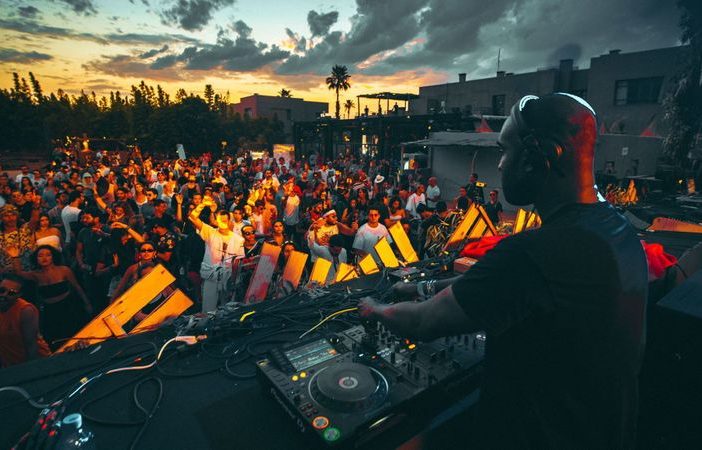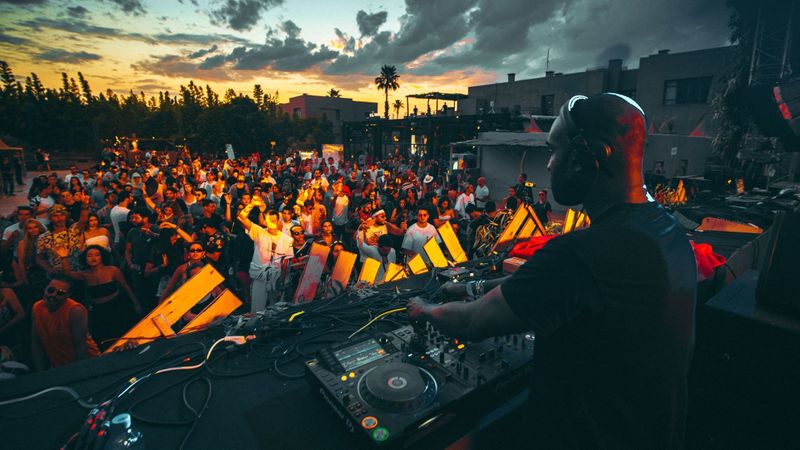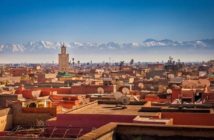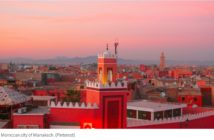Los Angeles Times
by August Brown
Around 2 a.m. on a balmy night in Marrakech, a hundred or so dancers at the waning end of their rave swayed in front of a tiny moonlit stage. They had found their way down a semi-secluded path toward the back of the Oasis Festival in September (Sept. 13-15 this year) at the Fellah resort on the outskirts of the old imperial Moroccan city.
This corner of the 2018 fest was Moroccan fashion designer Amine Bendriouich’s personally curated stage, and the designer, dressed in flowing whites, could not stop grinning.
Next to him, Virgil Abloh, the men’s artistic director for Louis Vuitton, chopped up Drake remixes into African hip-hop as the scents of ras el hanout and roasted carrots wafted over from a nearby tagine stand. The breeze shook the racks of Bendriouich’s brightly patterned, gender-fluid designs, silhouetted against flickering LED installations.
Bendriouich couldn’t decide whether to jump behind the DJ booth or dance until he fell. He finally did both, throwing his arms in the air and embracing everyone who passed. He was home, and now the world’s club-music elite had come to him.
As Coachella and other mega-festivals now require vacation-sized outlays to attend, many music fans have started asking why they shouldn’t just take an actual vacation. Music promoters have caught on to this. Smaller festivals, with locals and travelers in the audience, have sprung up in recent years in Mexico, Cuba and Uganda.
Oasis, known for bringing the vanguard of Western electronic music to this ancient city, is now a gateway to North Africa and the Middle East for music-minded travelers. This sliver of the cosmopolitan Arab world also attracts young local music fans eager to show how they’re reinventing their history.
“People really want to move Morocco forward, it’s such an amazing place,” said Marjana Jaidi, the festival’s founder. “Moroccans are very loyal to their country, and I had this desire to contribute to that.”
Morocco has long been a haven for artists and Beat-era literary travelers such as Paul Bowles, William S. Burroughs and Allen Ginsberg. In 1969, Jimi Hendrix had his mind blown in the coastal town of Essaouira, then closed Woodstock weeks later. Marrakech would seem a natural spot for a festival, close to the capitals of Europe but with millenniums of its history to pull from.
Jaidi conceived of the festival as a teenager living in New York, when she saw how stereotypes about the Islamic world could twist minds.
“The seed was planted after 9/11, when I had this really racist encounter,” Jaidi said. “Travel is a necessity to understanding cultures. This mission has always been to inspire people to travel through music. My hope is that people will come here and … not have such a simple perception of the Arab world.”
Music and art
If you came to Oasis with a narrow view of that world, the festival quickly upended it.
The Museum of African Contemporary Art Al Maaden (MACAAL) set up an on-site mini-gallery with an exhibition “Flying Over Africa,” showcasing ruminative photography, video, painting and sculptural work by contemporary African artists. It proved a welcome haven from the nonstop music.
Hungover club kids stopped in their tracks outside the gallery to watch a Moroccan ensemble perform a daytime ahwach, a haunting and communal mix of percussive chanting and ancient dance.
“Sometimes when I tell Moroccans that I’m a clothing designer, they’re like, ‘Oh, so you make caftans,’” Bendriouich said in a Sunday morning panel about the future of Moroccan art, moderated by MACAAL exhibitions director Janine Gaëlle Dieudji. “But when someone sees you open that window, you can push it.”
“I’m definitively a kid from an Arabic culture, but I also grew up between cultures and that creates a paradox,” added Marrakech-based artist Mo Baala, who also exhibited work at Oasis. “Life is a problem, and what [artists] do is solve problems. That confusion is the natural mode of creation.”
Confusion is good for art, but fortunately, Oasis ran a tight ship as a festival. Everything was laid out summer-camp style on the sandy but verdant Fellah property.
The main stages thrummed with every style of modern club music from performers such as Chicago legends Black Madonna and Derrick Carter as well as Avalon Emerson and Octo Octa, who typically play after-hours sets in smoky downtown warehouses. Although the music was mostly international, Moroccan acts such as Casablanca’s Daox played sets that were rooted in their own traditions but could have suited clubs such as Berlin’s famous Berghain.
“Electronic music has always been about open mind, accepting everybody the way they are no matter the nationality, the ethnicity, the religion or the sexual orientation, and Morocco has had this culture for decades,” said Moroccan producer and DJ Amine K.
“The whole world is going into a weird and deceptive conservative path, but Morocco has been a crossroads for people from all around the world for centuries. This is what we are trying to show to the foreigners, but also to remind our people what our country and our way of thinking is really about.”
On the first day of the festival, Evelyn Levy and her son Julien Levy eased into the afternoon on floats by the poolside stage. They had traveled from the U.S. for a long-planned dual-birthday trip (she, 60; he, 30).
“A couple of years ago, he said he’d go to a festival with me,” she said. “I knew it had to be in an exotic setting, so I just started Googling and within an hour I said, ‘I think I found the one.’”
She is Moroccan, so their Oasis trip seemed serendipitous. “It’s been such a turning point in our relationship,” Evelyn said.
“I said ‘Morocco? Dance music? Let’s go!’” Julien said. “I always knew my mom was coolest person in any room she walked into. She’s a total celebrity at this fest, watching her here has made me appreciate her for who she is.”
Like most festival weekends, Oasis passed in a blur (helped along by bartenders from the nearby cocktail lounge Baromètre). The Fellah has no close neighbors, so the music throbbed until sunrise.
Any comedown from the long nights of dancing could be alleviated with an iced mint tea, a dip in the pool or a reading from the on-site clairvoyant Jmiaa to tell you that your headache would soon subside.
Appealing to the local crowd
Jaidi isn’t quite set on how she wants to grow the festival, though she expects to add other shows around the world rather than expand her 5,000 capacity at Fellah. Bali is high on her list of future locales.
And though the festival’s future is promising, the grisly December killing of two Scandinavian tourists who were last seen in Marrakech deeply unsettled the country, which isn’t used to violence directed at travelers.
But Jaidi and her peers said they felt validated by all the Moroccan faces at Oasis, staying late into the night and dancing with abandon, opening up a new way of seeing their country and culture.
“Every festival in Morocco should first work with locals and attract the local crowd,” Amine K said. “I’ve seen some foreigners coming, thinking they know better than us, not even caring about having a Moroccan crowd. It’s sad, and they usually don’t succeed.
“On the other side, festivals who have been digging into Moroccan culture and fusions with Western culture, that’s a good way to make things last.”
On the way to an after-party at a nearby resort, half a dozen Moroccan, British and American festivalgoers piled into cars and cranked up the music, dodging the passing camel trains and women in headscarves leading their children to the market.
The Moroccan sun rose over rust-colored clay homes, the car speakers bumped with heavy bass, and both the past and future seemed close at hand.
“I know the global festival scene and I knew people would travel for this,” Jaidi said. “But I didn’t know if locals would care. One of the nicest parts is this exchange, and that’s what’s been so meaningful.
“My hope was to get everyone out of their comfort zone.”
If you go
THE BEST WAY TO MARRAKECH, MOROCCO
From LAX, American, KLM, Delta, Air France, Swiss and Lufthansa offer connecting service (change of planes) to Marrakech, Restricted round-trip fares from $1,160, including taxes and fees.
TELEPHONES
To call the numbers below from the U.S., dial 011 (the international dialing code), 212 (country code for Morocco), and the nine-digit local number.
GETTING AROUND
To get to and from the festival, Oasis operates a shuttle service that stops at many popular hotels and resorts in the area, including the Kenzi Menara, Adam Park, Es Saadi and Kech Boutique Hotel.
WHERE TO STAY
During Oasis, rooms at the the Fellah Hotel are reserved for staff and artists, but other high- and mid-level options are a short taxi ride.
El Fenn, Derb Moullay Abdullah Ben Hussain, Bab El Ksour, Medina, Marrakech; 5244-41220. Doubles from $300 a night.
Bab Hotel, Angle Bd Mansour Eddahbi, Rue Mohamed El Beqqal, Marrakech; 5244-35250. Doubles from $120 a night.
La Mamounia, Avenue Bab Jdid, Marrakech; 5243-88600. Rooms from $742.
WHERE TO EAT
Le Petit Cornichon, 27 Rue Moulay Ali, Marrakech; 5244-21251. Entrees from $8.
Baromètre, Rue Moulay Ali, Gueliz; 6668-86798. Set tasting menu $62.
Dar Yacout, 79 derb Sidi Ahmed Soussi, Bab Doukkala, Marrakech; 5243-82929. Set tasting menu $73.
TO LEARN MORE








